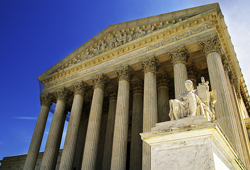 This morning, the United States Supreme Court issued two key decisions concerning the fundamental authority of the United States Patent and Trademark Office (USPTO) to institute inter partes review (IPR) proceedings.
This morning, the United States Supreme Court issued two key decisions concerning the fundamental authority of the United States Patent and Trademark Office (USPTO) to institute inter partes review (IPR) proceedings.
First, in Oil State Energy Services, LLC v. Greene’s Energy Group, LLC, the Court held in a seven to two decision that IPR proceedings do not violate Article III or the Seventh Amendment of the United States Constitution. Justice Thomas, writing for the Court, first determined that the grant of a patent falls within the public-rights doctrine and that IPRs review the same basic matter as in the grant of a patent. In analyzing the treatment of patents in England in the 18th century, the Court noted that in addition to the power of the courts to cancel patents, patents could be vacated on a petition to the Privy Council,which would have been known to the Framers. Additionally, the similarities between IPRs and district court proceedings do not lead to the conclusion that IPRs are an improper adjudication outside of an Article III court. The Court cautioned that this is a narrow holding and should not be construed to suggest that patents are not property under either the Due Process Clause or the Takings Clause. Additionally, the Court held that IPRs do not violate the Seventh Amendment. The holding was limited to the precise issues before it and did not foreclose the possibility of future constitutional challenges. Justice Breyer offered a concurring opinion. Justice Gorsuch dissented, and was joined by Chief Justice Roberts.
Second, in SAS Institute Inc. v. Iancu, the Court held in a five to four decision that when the PTAB institutes an IPR, it must decide the patentability of all challenged claims. Justice Gorsuch, writing for the Court, held that the plain text of 35 U.S.C. §318(a) requires that the PTAB address all challenged claims in a final written decision. As such, “partial institutions” lack any statutory basis and when the PTAB institutes an IPR, it must decide the patentability of all claims challenged by the petitioner, as opposed to only granting institution on some of the challenged claims. Justices Ginsburg and Breyer each wrote dissents, and were joined in part by Justices Sotomayor and Kagan.
As we previously reported, the Supreme Court heard oral argument in these cases this past November.
